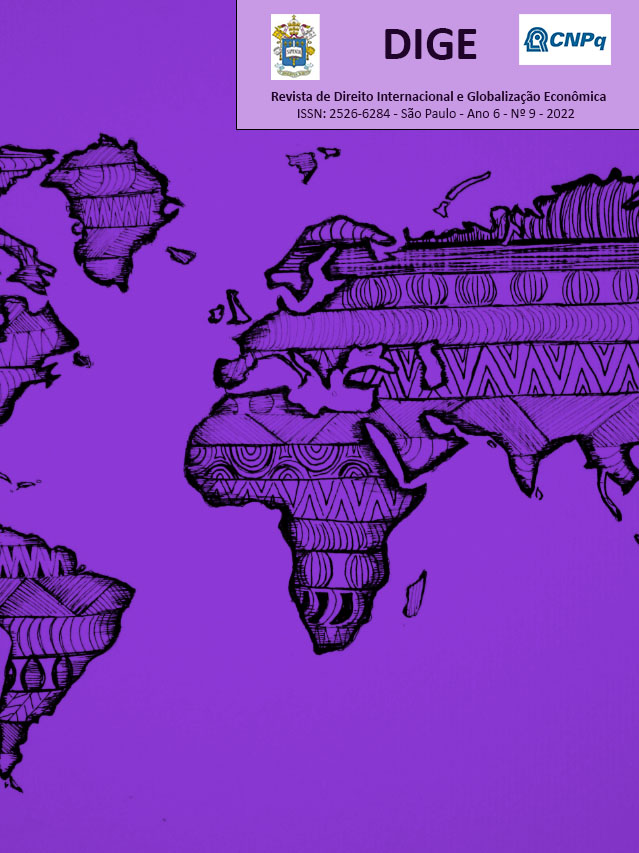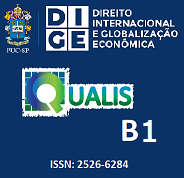The Court of The Human Rights as a Fourth Instance: Juridical Analisys
DOI:
https://doi.org/10.23925/2526-6284/2022.v9n9.59065Keywords:
ICHR, HUMAN RIGHTS, CIVIL CAPACITY, LAST INSTANCEAbstract
The life in society and the understanding of respect for the dignity of the human person has created several protection instruments and specialized mechanisms to mediate possible violations. In Americas, the Interamerican System for the Protection of Human Rights has a jurisdictional body of paramount importance for the protection of these rights: the Interamerican Court of Human Rights. Its function is to receive and judge demands that involve States with a regional scope. Access depends on meeting essential admissibility requirements. The question that this make is if it is possible to use the Court's decisions as an instance of reviewing national judgments, as a fourth instance, and the dynamics caused by these decisions in the domestic sphere of States and in the international sphere. The method is the hypothetical-deductive and the bibliographic and documentary methodology. Here, relevant details that begin in the analysis and extend to the final judgment will be analyzed.
References
ARENDT, Hannah. Origens do totalitarismo – antissemitismo, imperialismo e totalitarismo. São Paulo: Cia das Letras, 1989.
BRASIL, Superior Tribunal De Justiça. Workshop A Proteção Internacional dos Direitos Humanos e o Brasil. 2000, Brasília, DF. In A Proteção Internacional dos Direitos Humanos e o Brasil. Brasília, 2000.
CARBONELL, José Carlos Remotti. Sistema Jurídico, Democracia y Constitucionalismo multinivel. In:BORGES, A. W.; COELHO, S. de O. P. (coords.). Interconstitucionalidade e Interdisciplinariedade: desafios, âmbitos e níveis de interação no mundo global. Edição Laboratório Americano de Estudos Constitucionais Comparado. Uberlândia: 2015.
CORTE INTERAMERICANA DE DIREITOS HUMANOS. Disponível em: https://www.cidh.oas.org/basicos/portugues/v.Estatuto.Corte.htm. Acesso em: 08 dez 2018.
CRETELLA NETO, José. Direito internacional público. São Paulo: Revista dos Tribunais, 2019.
DALLARI, Dalmo de Abreu. Elementos de Teoria Geral do Estado. 29ª ed. São Paulo: Saraiva, 2010.
DEL’OLMO, Florisbal de Souza. Curso de Direito Internacional Público. 4ª ed. Rio de Janeiro: Forense, 2009.
DOUZINAS, Costas. O fim dos direitos humanos. São Leopoldo: Unisinos, 2009.
GOMES, Luiz Flávio. PIOVESAN, Flávia (Coord.). O sistema interamericano de proteção dos direitos humanos e o direito brasileiro. São Paulo: Editora Revista dos Tribunais, 2000.
JAYME, Fernando G. Direitos humanos e sua efetivação pela corte interamericana de direitos humanos. Belo Horizonte: Del Rey, 2005.
KJER, P. F. O sentido do político na concepção do transconstitucionalismo: um perspectiva sociológica. Revista Brasileira de Sociologia do Direito. Disponível em http://revista.abrasd.com.br/index.php/rbsd/article/view/371/194. Acesso em 11 set. 2019.
LAFER, Celso. A reconstrução dos direitos humanos: um diálogo com o pensamento de Hannah Arendt. São Paulo: Companhia das Letras, 1988.
LAFER, Celso. Comércio, desarmamento, direitos humanos: reflexões sobre uma experiência diplomática. São Paulo: Paz e Terra, 1999.
MATA DIZ, J. B. e JAEGER JR, Augusto. Por uma teoria jurídica da integração regional: a inter-relação direito interno, direito internacional público e direito da integração. In Revista de Direito Internacional (RDI).v 12i2.3710. Disponível em:https://www.publicacoesacademicas.uniceub.br/rdi/article/view/3710/pdf. Acesso em:05 out. 2019.
MOURA, Rafael Osvaldo Machado. Julgados da corte interamericana sobre casos brasileiros e políticas públicas: reflexões acerca de possíveis influições. Revista de Direito Internacional(v15i3.5683). Disponível em https://www.publicacoesacademicas.uniceub.br/rdi/article/view/5683/pdf. Acesso em:05 out. 2019.
NETO, José Cretella. Direito internacional público. São Paulo: Revista dos Tribunais, 2019.
PASQUALUCCI, Jo M. The Practice and Procedure of the Inter-American Court of Human Rights. Cambridge: Cambridge University Press, 2003.
PIOVESAN, Flávia. Direitos humanos e a jurisdição constitucional internacional. In Direitos humanos no cotidiano jurídico. Procuradoria Geral do Estado. Grupo de Trabalho de Direitos Humanos. São Paulo (SP), 2004.
PIOVESAN, Flávia. Direitos Humanos e a justiça internacional: um estudo comparativo dos sistemas regionais europeu, interamericano e africano. 5. ed. rev., ampl. e atual. São Paulo: Saraiva, 2014.
RAMOS, André de Carvalho. Processo internacional de direitos humanos. São Paulo: Saraiva, 2013.
SABORIT, IT. Religiosidade na Revolução Francesa [online]. Rio de Janeiro: Centro Edelstein de Pesquisas Sociais.p. 15-94, 2009.
TRINDADE, Cansado. Parecer n. 17 sobre a Condição Jurídica e os Direitos Humanos da Criança, de 28.08.2002, Disponível em http://midia.pgr.mpf.gov.br/pfdc/hotsites/sistema_protecao_direitos_humanos/docs/corte_idh/Jurisprudencia/MedidasProvisionais/Complexo_do_Tatuape_Febem/voto_cancado_trindade.pdf. Acessoem 21 jan. 2020.
UNITED STATES OF AMERICA. A brief history of human rights. United States Declaration of Independence (1776).Disponível emhttps://www.humanrights.com/what-are-human-rights/brief-history/declaration-of-independence.html. Acesso em 10 de set. 2019.
VELASCO, Manuel Dies de, Instituciones de derecho internacional publico. Madrid- ES: Tecnos Ed., 2002, p. 582




